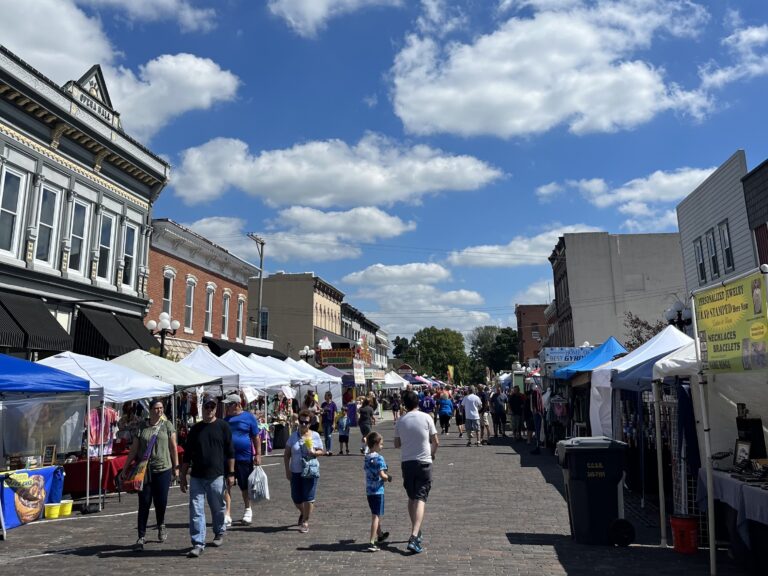ARCOLA – Drive a half-hour south of I-57 from Champaign and you’ll arrive in Arcola. The small town is in a part of the state known for its Old Order Amish community, centered around the nearby town of Arthur.
Now, Latinos in Arcola are increasing in population and power.

It’s close to lunchtime, and doors are finally open at Vita’s Food Taqueria. Meat begins to sizzle for customers waiting for their meals.
A “bienvenidos” or welcome sign with an image of Frida Kahlo greets you as you enter the restaurant. The vibrant orange and red colors in the dining area keep you company as you wait for your food.
Cynthia Gonzalez is the owner of Vita’s Food Taqueria and is preparing for lunchtime.
She said she came to Arcola in 2006 from Cadereyta Jimenez, Nuevo Leon, a city near the border of Texas and Mexico.
Like Arcola, where the Libman Company has been making brooms since the 1950s, Cadereyta Jimenez is also known for producing corn brooms. A simple broom, but its brush (the end that touches the floor) is made out of broomcorn (actually a type of sorghum).

“We know each other from years ago, from friends of my parents, and friends of my grandparents who grew up in the same town,” Gonzalez said. “We practically all moved to Arcola.”
Nearly three thousand residents call Arcola home. About a third of that population are Latinos, according to the latest U.S. Census data. But the growth goes beyond population.
Jesus Garza is the owner of 3J Transmission, a local car shop in Arcola. Garza not only owns the shop but is also the Mayor of Arcola.
“The first thing we are going to do is make changes,” Garza said. “They are being achieved, but slowly. We cried too because it is the first time that a Hispanic won in this area.”
In addition to fixing the streets and adding more street lights in Arcola, Garza said he has noticed a shift in perceptions toward the Latino community.

“All the people who thought that we Hispanics came here to rob have changed their minds completely,” Garza said. “They don’t think that anymore.”

On a sunny day in early September, residents and visitors walked around Arcola’s brick-paved streets for the 51st Annual Broom Corn Festival.
As festival-goers watch broom making and eat corn, Arcola High School student Alex Gutierrez said people’s minds are changing.
“You can’t really change people’s attitudes about things, but like, the whole fact that he (Garza) was able to actually win,” Gutierrez said, “like really changed a lot of people’s minds and actually open them up to new things.”
Fellow student Vincent Medina said they feel safer in the town now.
“Some of the people I haven’t been friends with in the past, because of their like, past problematic views like homophobia and racism and stuff like that,” Medina said. “I’ve talked to them more recently and their opinions have definitely changed, they feel a lot more welcoming.”
Thomas Saunders, an Arcola resident who works at a local food pantry, said Garza is doing a good job as mayor.

“I can’t tell you how great he’s been,” Saunders said. “He really has been fine to me, my family, everybody. I don’t know that anybody would have any way to complain about anything that he’s done.”
Garza said 15 businesses have opened in Arcola since he was elected mayor. He said he encourages and welcomes more.
Sandra Saldivar is a cake decorator and is in the process of opening up a Mexican Bakery. She said she was encouraged by Garza.
“I think everyone should see that and I think we learn from that,” Saldivar said. “If you know, that gives you that motivation. If they can do it, we can do it. And it’s good for Latinos to grow, you know, to be more in this country. A lot of them probably think, well, I don’t know the language, or I have to stay at it working for someone else or, but you know, it’s always good to do more.”
Garza said more people want to create businesses for themselves.
He said he hopes his position will encourage Arcola’s Latino community to follow his steps.
“I wouldn’t call it a challenge, but I would call it a great achievement for us as Hispanics, because I hope that if someone says ‘I will take your place, it’s my turn’ it’ll be another Hispanic,” Garza said.


